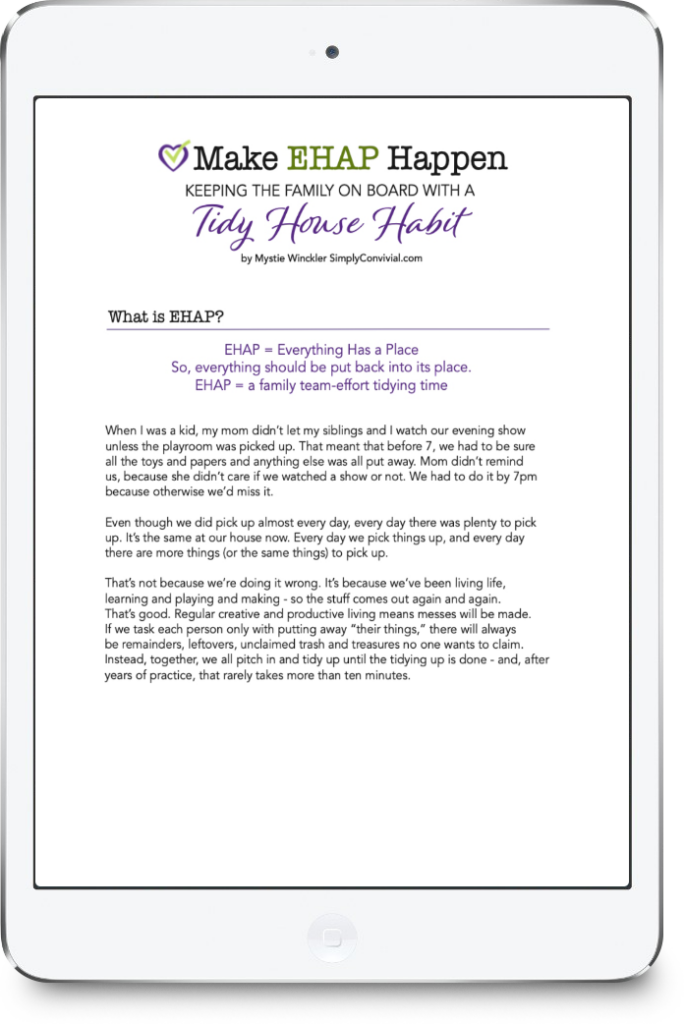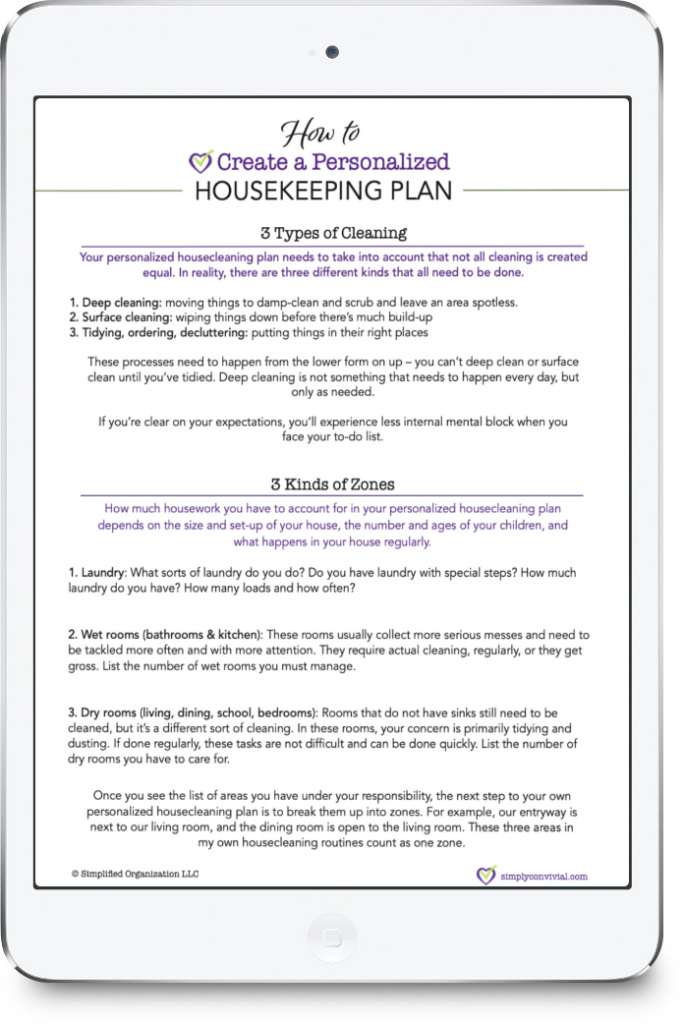
It’s a truth universally acknowledged that a homeschool mom in possession of a large family must be in want of a housekeeper.
That’d be nice, wouldn’t it?
Some families can actually swing it, but most of us are on our own when it comes to keeping up with both school and home.
Of course we can bring the kids on board, and sometimes husbands can lend a hand, but there’s still a lot to do.
Our homeschool year is over, but this is the perfect time for a home routines audit as well as a homeschool audit – look at what worked and what didn’t, and figure out what to do this summer to set ourselves up for a better year next year.
Next year is always going to be a better year, right?
So here are three ways to make it possible to keep the house functioning not at showcase level, but at “not getting in our way” levels during the school year.
Manage your expectations.
What does a “clean house” mean to you?
Think about it for awhile. Look around your house and notice what it is and what you want it to be.
Are your expectations too high? Do you want a pristine house with everything just so? If so, you’re going to be continually frustrated with the reality of having multiple children in the house.
Our homes are stages for the play of life. They aren’t stages for magazine shoots, where we idealize stasis. Instead, they are backdrops that either facilitate or inhibit the life played out within the walls. When we tidy things up again, our efforts aren’t futile; our efforts are those of stage managers, getting ready for the next scene.
Are your expectations too low? Maybe you’ve given up. I’ve been there. If you think it’s impossible to keep on top of clean dishes and clothes and if you’ve accepted clutter everywhere as your inevitable fate, you might need to gear up and level up.
Our homes are tools to be used. If, through neglect and despair, we let them dull and rust and rot, they aren’t going to be helpful in our calling. When we can’t find the book we need, when no one has clean socks, when you can’t go barefoot because of the crumbs, our houses are hindrances rather than helps.
How we think about our homes and our work matters. Most of our frustration comes from bad attitudes and false expectations.
Don’t give up on the work; give up the resentment.
Read more about housework expectations: Organize life with realistic expectations.
Think in intervals.
We can’t do everything every day.
When we’re rocking the school schedule, the house will show it.
Our energies can only be spread so far – and often there simply isn’t enough to go around. Rightly, the house gets the leftovers, not the children.
That’s why we need to break up our projects and terms into sprints, which I like to call intervals.
Every 6-8 weeks, take a long weekend at the very least – a whole week if you can manage it – skip the school and focus on the house. Clear the clutter, dust the shelves, do what needs to be done to keep you sane.
We can only focus on 1-2 things well per day. So find a way to make that work rather than trying to force more in. Schedule Saturday morning chores. Give yourself a day or two every interval – between school terms – to pull the house back together.
Then accept that the house will fray for a time, but you know you’ll get to it in its own time, so you don’t have to worry about how bad it’s going to get. Instead of letting it drag you down, you have taken it into account in the plan and will deal with it in your own good time.
Read more about interval planning: Interval Planning for Growth
Make EHAP a habit.
EHAP is our family name for an afternoon quick tidy. It’s an acronym for Everything Has A Place, and the implication is that we should put the things in their places.
When we regularly – that is, nearly daily – bustle around the house, simply putting things back where they belong, it is staggering what a difference it makes not only in the state of the house but also in the state of our minds and relationships. There is, literally, nothing cluttering the path.
It makes the effort worth it. And the more we practice it, the easier it becomes.

Want a Tidier House?
- Get clear where and when your family needs to tidy up.
- Bring the kids on board to take responsibility for tidying more than their own stuff.
- Learn the three steps to make the habit stick for the long haul.
If it feels hard to juggle life, homeschooling, and the housework, that’s ok – it is hard!
But it’s our calling, and we will find joy and satisfaction when we throw ourselves whole-heartedly into the work.
In my opinion, following someone else’s housecleaning task list just isn’t going to work. Each person’s house, family, habits, and standards are different.
However, I also don’t think coming up with a personalized housecleaning routine is hard.
So I’ve made a quick-win 3-page guide so you can set up a housecleaning plan that works for your situation and your needs.
Summer is a great time to put a housekeeping plan in place.



I think I’ve reached the point where I just really need to make a place in our budget for a housecleaning service. Homeschooling + work-from-home Dad just means we’re here a lot, working hard, playing hard…and the cleanliness (or lack of it) is a mental and physical burden on me.
I’m going to get some estimates, but I think if someone else can work on the deep cleaning in the bathroom, kitchen, dusting and such, we can handle the tidying, daily quick-cleans, laundry and other housekeeping tasks a bit better.
My main priorities are as Wife, Mom, and Home Educator. Wife and Mom are relationship-focused, not housekeeper-focused, and I just plain can’t do it all well.
Coming to this conclusion has been a weight off!